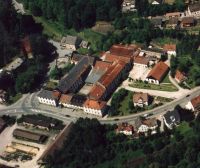You are here:
Abbeys > Germany > North Rhine-Westphalia > Marsberg > Bredelar
Bredelar
 In the year 1196, the Archbishop of Cologne summoned monks from the Cistercian Abbey in Hardhausen to establish a new abbey in a former Premonstratensian convent nearby that had been founded in 1170 but disbanded shortly thereafter. As abbey and landholder, the Zisterze Breidelare would go on to spur the economic, intellectual and spiritual growth of the northeast Sauerland region. The Bredelar Abbey thrived for a good 600 years. In the 13th century its distinguished scriptorium produced the three-volume, richly illuminated Bredelar Bible, which is today kept in the Hessian State and University Library in Darmstadt. Other manuscripts from the abbey's library are preserved today in Wiesbaden, Berlin, Boston, Liverpool, Manchester, Oxford, Paris and Washington. The remaining building fabric of the abbey is based on a construction plan from 1726. In 1804 the abbey was disbanded in the course of secularisation. From 1828 to 1932, the monastery was home to an ironworks and foundry called Theodorshütte. Theodorshütte was initially set up as both smeltery and foundry of iron, with the first of its three blast furnaces erected in the former abbey church. From 1876 the iron foundry formed the centre of operations, producing extremely large machine parts, building components, iron window frames and stoves. In the latter half of the 20th century, the building progressively deteriorated and fell into disrepair. In 2000, the friends' society Kloster Bredelar e.V. was founded with the aim of restoring the complex for use as a community and cultural centre.
In the year 1196, the Archbishop of Cologne summoned monks from the Cistercian Abbey in Hardhausen to establish a new abbey in a former Premonstratensian convent nearby that had been founded in 1170 but disbanded shortly thereafter. As abbey and landholder, the Zisterze Breidelare would go on to spur the economic, intellectual and spiritual growth of the northeast Sauerland region. The Bredelar Abbey thrived for a good 600 years. In the 13th century its distinguished scriptorium produced the three-volume, richly illuminated Bredelar Bible, which is today kept in the Hessian State and University Library in Darmstadt. Other manuscripts from the abbey's library are preserved today in Wiesbaden, Berlin, Boston, Liverpool, Manchester, Oxford, Paris and Washington. The remaining building fabric of the abbey is based on a construction plan from 1726. In 1804 the abbey was disbanded in the course of secularisation. From 1828 to 1932, the monastery was home to an ironworks and foundry called Theodorshütte. Theodorshütte was initially set up as both smeltery and foundry of iron, with the first of its three blast furnaces erected in the former abbey church. From 1876 the iron foundry formed the centre of operations, producing extremely large machine parts, building components, iron window frames and stoves. In the latter half of the 20th century, the building progressively deteriorated and fell into disrepair. In 2000, the friends' society Kloster Bredelar e.V. was founded with the aim of restoring the complex for use as a community and cultural centre. [ Back ]
